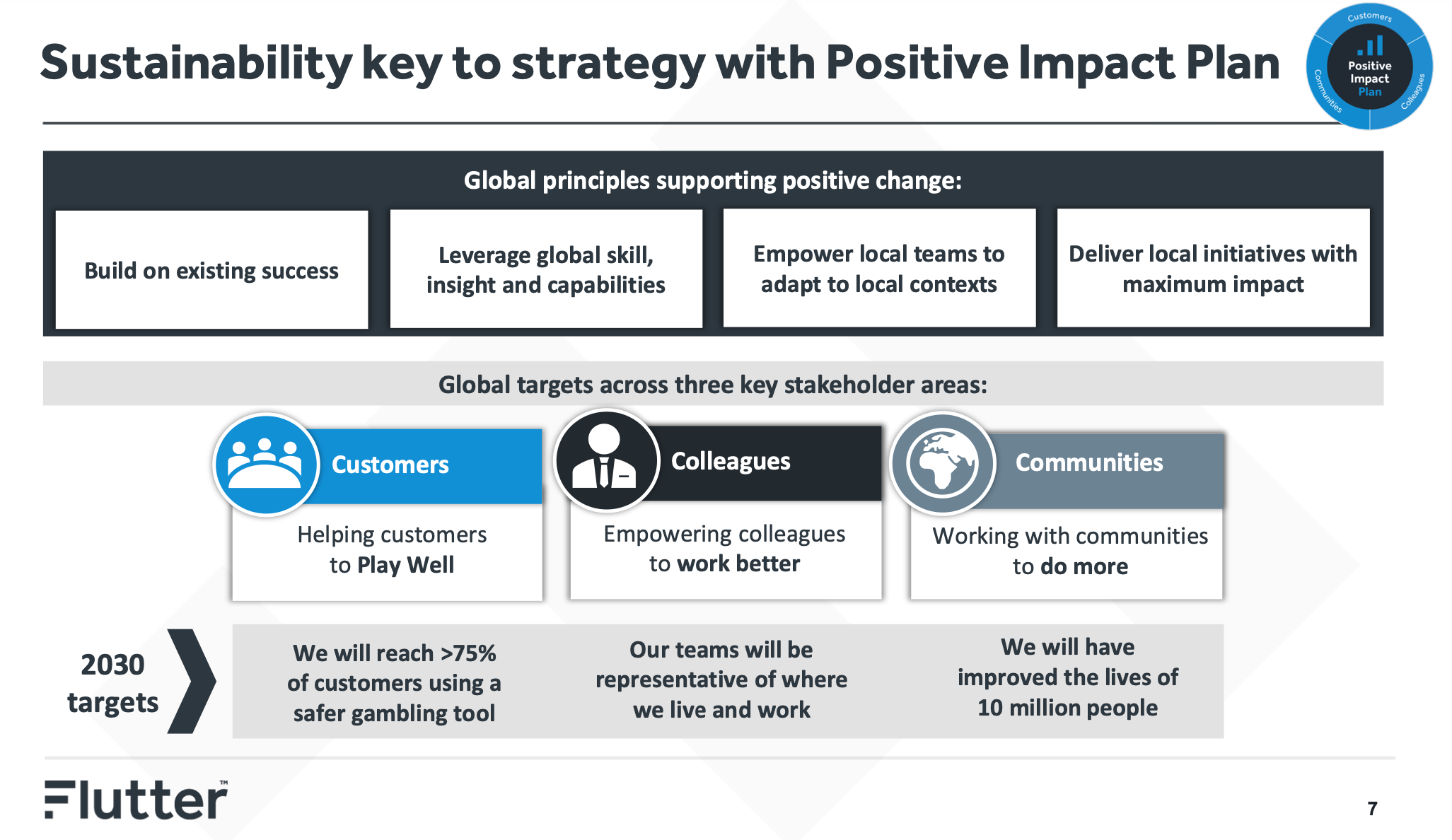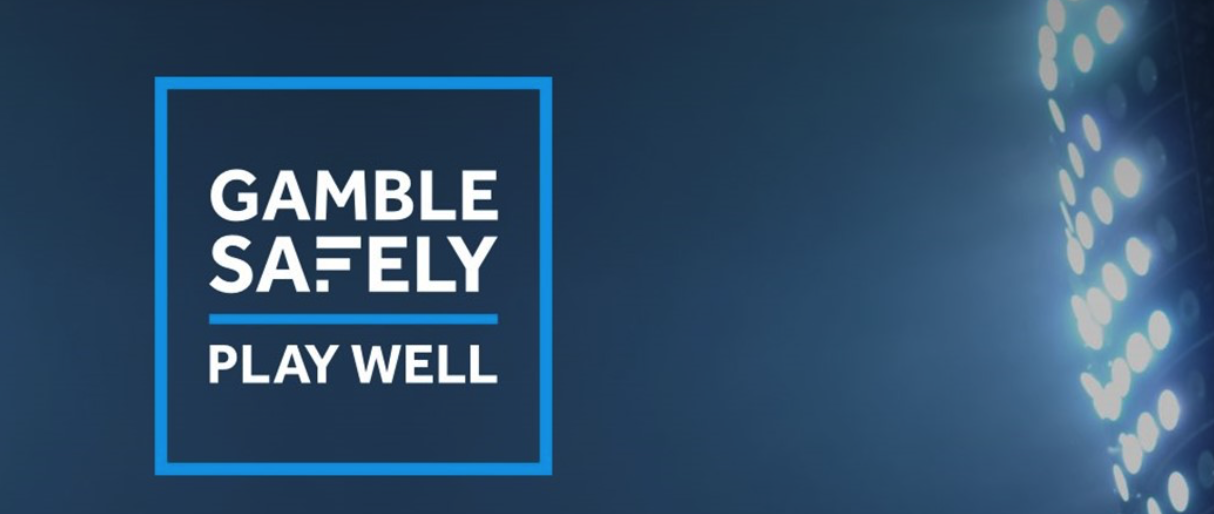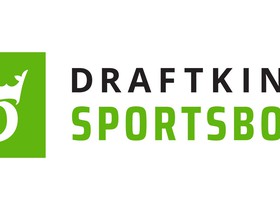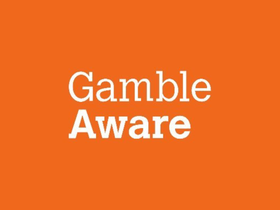We do not believe it would be productive for the industry to provide a load of figures based on different metrics and methodologies. Comparing apples with pears would be counterproductive.
Flutter has released a new global responsible gambling initiative called Play Well that eschews a one-size-fits-all approach to tackling harmful gambling behavior. Instead, it aims to take a more holistic approach across all of its brands around the world in order to provide players with the “tools, information, and support to enable a positive, safe, and entertaining experience.”
The Play Well initiative hopes to see over 75% of Flutter’s customers using responsible gambling tools by 2030 and over 50% by 2026 — as outlined in the group’s preliminary end of year financial results presentation.
Flutter UK&I Division: At A Glance
- Sky Betting & Gaming (inc Sky Poker & Sky Casino)
- Paddy Power
- Betfair UK
- Tombola
Hopefully, this is an achievable goal considering the group has given itself four to seven years to reach that target. Compare that to the Kindred Group’s Responsible Gambling goal of generating zero revenue from harmful gambling by 2023 and Flutter’s proposal looks much more modest.
“This year, we are introducing tailored Play Well metrics across our global organization, which will be directly linked to colleague remuneration,” a spokesperson for Flutter told Sports Shield. “These metrics have been developed on a divisional basis to ensure that each business is focused on the initiatives that will support and promote its local safer gambling strategies, taking into account individual markets and contexts, whilst being consistent with our global Play Well Principles.”
This is the first time that a gambling operator has tied responsible gambling goals to employee pay. It is an interesting incentive — work hard to get players to use our responsible gambling tools and, if we reach our goals, you will be rewarded monetarily.

Over in the UK&I division of Flutter, Play Well has spawned an offshoot initiative called the Safer Gambling Strategy, which includes the creation of the Affordability Triple Step program.
In addition, 2021 saw the UK&I division roll out many new responsible gambling measures across their brands, including:
- Mandatory deposit limit trial for under players under 25.
- Early credit checks on new low threshold customers
- Proprietary AI technology to monitor 250+ behaviors
- Age-based spend checks and deposit limits
- Financial vulnerability checks with age and risk-based limits applied
- Product changes to improve the safer gambling experience
- 10 staking limit on online slots
- Removal of auto-spin on casino products
- Daily deposit limits introduced
- Financial vulnerability checks using third-party agencies
In addition, a fail-safe has been introduced called an affordability backstop, to ensure customer intervention where other controls have failed.
Responsible Gambling Glossary & Primer
- Play Well: A global initiative that runs across all Flutter brands beyond the UK&I markets and brands
- Safer Gambling: The department name that oversees responsible gambling measures in the UK&I
- Affordability Triple Step: A new three-tiered process for checking customer funds
- The UK Betting and Gaming Council (BGC): Is the single industry body for UK betting and gaming
- Problem Gambling Severity Index: Is the standardized measure of at risk behavior in problem gambling. It is a tool based on research on the common signs and consequences of problematic gambling
- The Diagnostic and Statistical Manual of Mental Disorders, Fourth Edition — DSM-IV: The official manual of the American Psychiatric Association, includes criteria for Pathological Gambling and Gambling Disorder
With all these new initiatives in mind, Luke Sugden, Director of Risk and Safer Gambling for Flutter UK&I shines the light into the RG efforts undertaken by the UK&I division and what 2022 has in store.

Please tell us about the responsible gambling department at Flutter and your role within it?
My role is Director of Risk and Safer Gambling for Flutter UK&I. Safer Gambling is paramount to everything we do and I manage a dedicated Safer Gambling Strategy Team consisting of five colleagues. We work really closely with all of our UK&I brand and operational teams, including our 180+ front-line Safer Gambling colleagues who are on hand 24/7 to keep our customers safe.
How do you coordinate responsible gambling efforts across your full suite of brands, or does every brand have autonomy in what it does?
Our global footprint gives us insight into many different gambling markets across the world and, whilst player safety is a top priority everywhere, there is no “one size fits all” in the policy application. Each division has a level of autonomy to implement measures that are most appropriate in that market. However, we are constantly sharing learnings across the business and ensuring measures are constantly monitored and refreshed as necessary.
During 2019, Flutter donated 0.1% UK Gross Gambling Yield to the “research, education and treatment of problem gambling, as encouraged by the Gambling Commission”. Can you confirm if you made this donation in 2020 and 2021?
We remain committed to research, treatment, and education across our markets. In 2020, in the UK, we donated over £9 million of our gross gambling yield to the research, education, and treatment of problem gambling and we have committed to achieving a 1% contribution in 2023, in line with a pledge from the largest operators to collectively contribute £100m over four years. In 2021, we directly invested over £45m to support and promote safe play across our global operations.
Please explain more about your new Affordability Triple Step program?
Our Affordability Triple Step, which works in conjunction with our Safer Gambling controls where we already use cutting-edge technology and algorithms to stay close to our customers, monitor individual behavior, and assess their circumstances. Using our insights and evidence, we developed the Affordability Triple-Step to specifically strengthen our financial harm prevention controls and we believe it gets the balance right — supporting customers on our platforms and allowing us to step in and protect the most vulnerable where appropriate.
It works by having three layers of protection. Firstly, identifying financial red flags (such as bankruptcies) at registration; secondly, ongoing and real-time monitoring of all customers; and, thirdly, bespoke spending backstops, which means that we can support players throughout the customer journey, helping us to keep gambling a safe and enjoyable experience for all our customers. We believe there need to be lower backstops for younger customers as, generally, they have lower affordability and are at higher risk of potential harm.
You are now carrying out financial vulnerability checks early in the customer journey — when exactly does this happen? Will every customer undergo a check? If not, how do you determine who gets checked?
We believe blanket measures are blunt instruments that fail to address the root of the issue of problem gambling.
Each customer’s circumstances are different, which is why we need to take a risk-based approach and look at the issue of safer gambling and affordability on an individual basis.
We are not waiting for legislation before taking steps that we feel are right for our customers. Customers will be checked for red flags such as bankruptcies and County Court judgments at different points in their journey depending on their age and levels of spending — it’s not just a check early in a customer’s account history with us. Depending on what we find out about a customer, different levels of limits can be applied.
Please tell us in real-life terms more about the “enhanced monitoring and interaction of customer activity”?
We run 24/7 monitoring of all customers, looking at playing behaviors such as changes in the size of bets or deposits, the products used, or time spent on site. This means we can assess any changes in behavior and interact with customers quickly to ensure we keep them safe.
Tell us why you felt it was important to roll out the £500 per month net deposit limits set for under 25-year-olds. Does this apply to all brands within Flutter?
Prevalence Surveys have shown that customers aged 18-24 are at elevated risk according to the Problem Gambling Severity Index (PGSI) and The Diagnostic and Statistical Manual of Mental Disorders, Fourth Edition (DSM-IV) criteria for problem gambling, so that is why we have focused on this customer segment. This, combined with other research and experience from other industries (like finance and car insurance), gave us a consistent view that younger customers have a higher risk profile.
This is being automatically implemented for our UK&I brands. However, as part of our new global Play Well strategy, we are looking to apply any learnings from divisional initiatives across other parts of the business as appropriate.
Please can you tell us practical examples of how you will implement each of your new RG pillars?
Our strategy is based on shifting our approach to focus much more on the best methods of prevention and not to focus purely on intervention. This work has informed a new Safer Gambling strategy, based on the Group’s global Play Well strategy and composed of five main objectives with priority initiatives. The five core pillars of the strategy with an example of a tactic for each are:
- Discover: Proactively advance the industry’s understanding of gambling harm. Engage in more research and collaborate with other operators to share these learnings.
- Educate: Improve all customers’ and colleagues’ understanding of gambling harm. Improve Safer Gambling training for all of our colleagues, provide more literature for customers on what safer play looks like.
- Empower: Give every customer the tools and understanding to use our products safely. Champion the use of tools and deposit limits with our customers, by normalizing the use of them for all, e.g. our Sky Bet above-the-line advertising.
- Understand: Identify everyone exhibiting higher-risk behaviors early in their risk journey. Ensure our behavioral models can find customers beginning to increase in risk at the earliest possible opportunity and then step in before they get into difficulty.
- Support: Interact with more customers and give the right level of support for each. Increase early interaction with customers, such as digital interactions that are tailored to the individual, their specific circumstances, and player behaviors. These pillars are part of our UKI Safer Gambling strategy, so they do not cover our other brands outside of the UK&I.
How do you think the responsible gambling policies stack up against other operators in the industry? Do you look at anyone in particular and think they are doing a good job?
While we will continue to lead a race to the top in safer gambling, we believe it requires the whole industry — operators, trade associations, and regulators — to support each other if we’re going to bring about meaningful progress. We don’t compare ourselves to other operators as we believe all that matters is that all operators are working to make the betting and gaming space safer.
How far do you think the industry has to go to create a completely safe and responsible gambling environment for all their customers?
Working as a collective through trade associations is one of the most important ways to establish standards across the industry that help to support and protect our customers. Flutter, alongside other large operators, are members of the UK’s Betting and Gaming Council (BGC) where, collectively, we work together on a range of safer gambling initiatives to support and educate customers.
Kindred are openly discussing their plans to generate zero revenue from harmful gambling by 2023. What are your thoughts on this? Do you think it is a realistic goal? Is it something Flutter would consider doing?
We do not believe it would be productive for the industry to provide a load of figures based on different metrics and methodologies. Comparing apples with pears would be counterproductive to the real mission, which is protecting those at risk of harm.
As with everything in life, it’s not possible to remove 100% of the risk from any activity. Our aim is to minimize the risks as much as possible to keep our customers safe and to provide the best possible support if things do go wrong. We commend the ambition that Kindred has shown with its plan and in the work that the company is doing to reduce harmful gambling.
What are the main responsible gambling goals you would like to see Flutter achieve in 2022?
Within the UK&I Division, we are really excited about delivering our limits for all customers under 25 and learning how this helps to keep more of our customers safe. We are also excited about increased collaboration across the industry to conduct new and insightful research and to increase standards across all operators.
Globally, we will also be introducing a new reporting structure to enable a more consistent approach to measuring and communicating our progress on our safer gambling initiatives, whilst recognizing the varying levels of regulatory maturity across our local markets.
Our longer-term goal for our Group-wide Play Well strategy is to have 75% of our active online customers using one or more of our Play Well tools by 2030, with over 50% using one or more tools by 2026.




